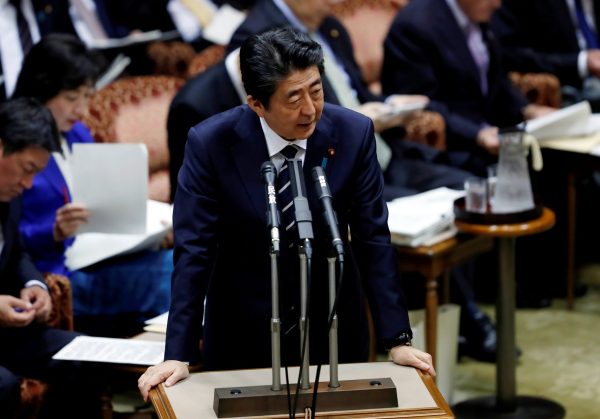The fallout from these misdemeanours has been large and is growing: the resignation of a minister (Tomomi Inada as defence minister), the loss of Prime Minister Shinzo Abe’s popularity and credibility (the Abe cabinet’s approval rating is at its lowest since his second administration began), the suicide of a local government official and resignations of key officials from the Ministry of Finance.
Yet the public impression is that many heads that should have rolled haven’t — beginning with Finance Minister Taro Aso and extending to the Prime Minister himself. The disquiet is even spreading to Japan’s ruling Liberal Democratic Party, with key leaders expressing sympathy for the profound public scepticism over whether or not the complete truth of any of the scandals has been revealed.
Academic economist Masaru Kaneko argues that these developments reveal a deeper ‘structural problem’ in the Abe administration, attributing the primary cause to the new system of appointing senior bureaucrats led by the Cabinet Bureau of Personnel Affairs. Not only does it allow the prime minister and chief cabinet secretary to become intimately involved in the personnel affairs of national public servants, but it has also produced bureaucrats who ‘surmise’ what the Kantei (the Prime Minister’s Office) wants. The result is an erosion of the neutrality, fairness, moral standing and competence of the Japanese bureaucracy. Hideaki Tanaka agrees, saying that ‘the fundamental problem of [Japan’s government bureaucracy] is that public servants’ expertise is being belittled and politicised’.
Another cause is the elevated position of the prime ministerial executive to the pinnacle of government power. Not only does the prime minister himself now exercise unprecedented power but so do many of the key support players involved in the scandals besetting the bureaucracy and the wider Abe administration.
The most senior is Deputy Prime Minister and Finance Minister Aso who presides over the goings-on in his own ministry but who, so far, has steadfastly refused to resign and take responsibility for his ministry’s involvement in the scandals.
Others include Abe’s executive secretaries such as Takaya Imai from the Ministry of Economy, Trade and Industry (METI). Imai is Saeko Tani’s superior — Tani was previously appointed to work for the Prime Minister’s wife and sent a fax ‘asking’ about Moritomo Gakuen’s land transaction to the Office of Individual Issue Coordination of Government Assets. Tani also benefited from an exceptional promotion to the position of First Secretary at the Japanese embassy in Rome as soon as the scandal was exposed.
Similarly, Tadao Yanase — Abe’s former executive secretary and now a leading bureaucrat in METI — is on the record as having told prefectural government officials that the Kake Gakuen plan to construct a new veterinary school in Ehime prefecture was a ‘matter concerning the Prime Minister’.
Another important player is Chief Cabinet Secretary Yoshihide Suga, given his pre-eminent de facto powers over personnel appointments to senior positions in the bureaucracy. Suga’s deputies also figure in the scandals.
Former deputy chief cabinet secretary Koichi Hagiuda was not only the formal head of the Cabinet Bureau of Personnel Affairs but also reportedly a key participant in the Kake Gakuen scandal. He allegedly communicated ‘the Prime Minister’s intention’ to the education ministry official in charge of the matter. This suggests that Kantei personnel have assumed the role of ‘agents’ of the prime minister in making known his wishes to bureaucrats. In this way, Abe can deny any direct involvement in the scandals.
Kaneko argues that these scandals are symptomatic of the growing phenomenon of ‘crony capitalism’ in Japan, which is flourishing under the ‘politics of the prime minister’s dominance’. It is taking its toll on the Japanese economy because of government support to uncompetitive industries headed by those who are close to the prime minister.
‘Crony capitalism’ refers to an economic system where the usual democratic checking functions do not work and, as a result, benefits are doled out to people close to those in power. In Japan today, it involves the provision of favours to the prime minister’s friends and the suppression of objections or criticisms.
Japanese political scientist Koichi Nakano writes in similar terms in his latest book, arguing that the Kake Gakuen and Moritomo Gakuen scandals ‘have contributed to a perception that Prime Minister Abe has appropriated the state for the benefit of private interests and his personal network’.
Against an avalanche of bad press and declining approval ratings, Abe has two tried and true diversionary tactics: calling a snap election and overseas diplomatic ventures. It remains to be seen how fruitful either of these manoeuvres will be this time.
Aurelia George Mulgan is a Professor in the School of Humanities and Social Sciences at the University of New South Wales, Canberra.


Thanks for an informative summary of the number of different people and ministries involved in these ‘school’ and other scandals. Thanks, too, for a succinct explanation of the ways in which the underlying structure of the system was changed by Abe in a manner that allowed these events to take place.
I would add that crony capitalism is not a recent phenomena in Japan. Roger W Bowen published a book in 2002 in which he outlined the longstanding history of such behavior by almost every PM in the post WW II period. It is titled Japan’s Dysfunctional Democracy: The Liberal Democratic Party and Structural Corruption. The book is only 152 pages long. I would encourage those concerned to read it.